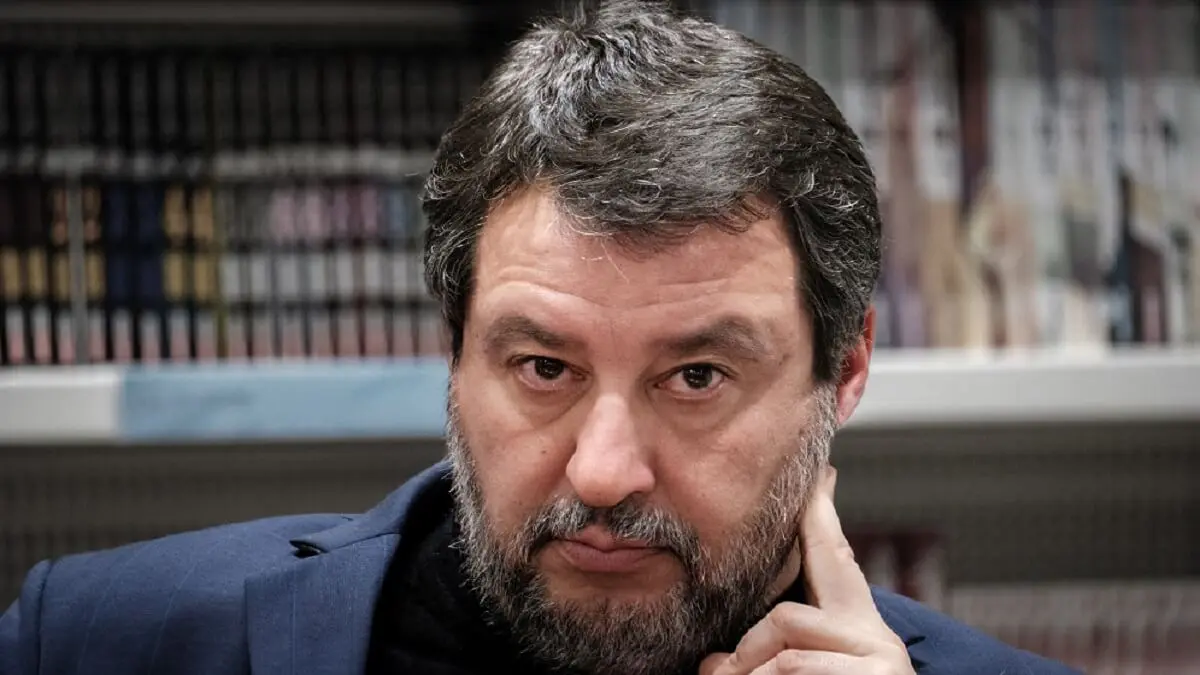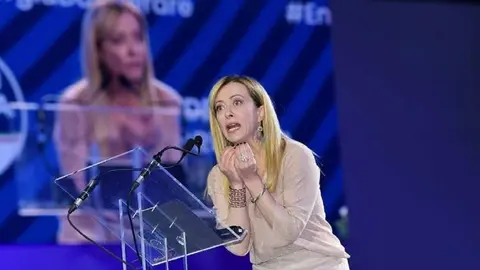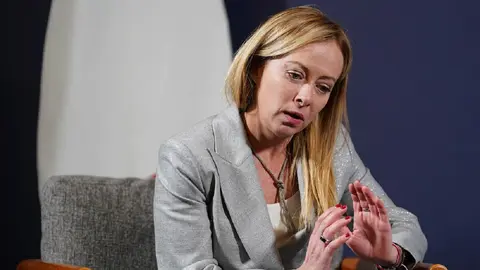Italy: the decline of Matteo Salvini's leadership

The elections to the government of the Abruzzo region that have just been held (9-10 March) have confirmed a trend that began in the first months of the year 2022: Matteo Salvini's leadership of the historic party known as the "League" is experiencing a real decline that forewarns that it is only a matter of time before the party founded by Umberto Bossi in 1987 looks for a new leader.
Matteo Salvini has been the leader of this party since 8 December 2013, succeeding the late Roberto Maroni. Salvini won those primaries by a landslide, with 67% of the votes, and he did so precisely on the same day that another politician of his generation, Matteo Renzi, won the Democratic Party (PD) primaries (in his case, with 70% of the votes). Since then, while Renzi first had to resign as leader of the PD (July 2018) and finally found his own party (Italia Viva, September 2019), Salvini has had no rival within his party.
The rival was himself, and his numerous mistakes, plus his no less important shortcomings, are going to lead him to have to make way for another new leader. What is more, for months certain federations in Lombardy and Veneto have been calling for Salvini's resignation, but he clings to his position not only as party leader, but also as deputy Prime Minister and head of infrastructures, with key votes for sustaining the Meloni government since it began to function at the end of October 2022.
Salvini had been able to make the most of the League's lack of leaders, as well as its youth. Umberto Bossi, the founder, fell "in disgrace" in November 2011, when President Napolitano decided to put Boconi University rector and former European Commissioner Mario Monti in charge of forming a government: the centre-right not only lost power, but also began a journey through the desert that would last no less than eleven years.
Bossi wanted his "right-hand man", Roberto Maroni, who had been part of several governments and had even become governor of the most important region of the country (Lombardy), to succeed him. But Maroni did not succeed in raising the party either, and in the February 2013 elections the historic party of northern Italy won only 17 senators out of a total of 315 at stake. Maroni resigned and new primaries were called, giving way to the generation of the seventies, as Salvini's only real rival, the now Minister of Economy and Finance Giancarlo Giorgetti (born in 1966), was considered to have passed to a leader almost two decades younger than Maroni (Salvini is from March 1973).
At that time, Salvini had a bulging political CV: councillor in the city council of the capital of Lombardy, member of parliament and MEP. And he had it because at the age of 20 he had left his studies to go into politics. This would eventually reveal his tremendous intellectual shortcomings, making him the typical "son of organic politics". And in the European Parliament he would soon become famous for his friendships with the main anti-European leaders, including some of the most prominent ultra-right-wingers, although Salvini has never really belonged to the ultra-right, but rather to ultra-nationalism, to which he would eventually add an important populist image.
During the first stage of his mandate as head of the League (2014-2017), Salvini hardly shone. Those were the years of the stardom of the "altro Matteo" (Renzi): president of the Council of Ministers between February 2014 and December 2016, the Tuscan politician became the youngest "premier" in the history of republican Italy and also managed to exceed 1,000 days in office with a single executive (something only Silvio Berlusconi and Bettino Craxi had achieved twice and once before). The reality was, however, that the constant arrival of irregular immigrants (with an average of some 150,000 per year) was paving the way for Salvini so that, once Renzi fell (which would happen in March 2018), he would occupy the most important position in transalpine politics. In the general elections of 2018, the League obtained more than 17% of the votes, becoming the leading force of the centre-right (relegating Forza Italia to second place) and increasing the number of senators from 17 to 60.
Although the centre-right, with 37% of the vote, had won those March 2018 elections, the most voted formation had been the "anti-politics" party known as Five Stars, with 32.6% of the vote. So there were only two possible government coalitions: either Five Star with the Democratic Party (PD), which was the one desired by the President of the Republic (Sergio Mattarella), but which Matteo Renzi, who still controlled the parliamentary groups, flatly refused to accept, or the coalition that finally came into being in the first week of June 2018: Five Star and the League (the so-called "giallo-green" coalition).
It was there that the best version of Salvini was seen: he skilfully negotiated the coalition with his counterpart Luigi di Maio, a politician of very low level and even less education than Salvini. The result: the presidency for Five Star, and Di Maio as Deputy Prime Minister and holder of two different portfolios (Labour and Economic Development), but Salvini, who would also be Deputy Prime Minister, took the portfolio that most benefited him, which was none other than the Interior. From there, the Lombard politician launched an aggressive policy of ports closed to illegal immigration (which would cost him, by the way, up to three prosecutions for alleged "boat hijacking", something with little basis in fact) and which would have the support of up to 70% of the Italian population, fed up with seeing how the EU authorities did not help the eurozone's third largest economy when it came to defending the country's borders.
Di Maio thought he could counterbalance Salvini's popularity with the so-called "citizenship income", a crude vote-buying system (consisting of giving up to five million citizens a monthly income of 750 euros), but the European Union was there to stop Di Maio and Five Star's intentions. In the end, not even a million people would receive this "citizenship income", and they would not start receiving it until a year after the so-called "government of change" was formed. This gave Salvini the chance to inflict defeat after defeat on Five Star in the various elections for the government of a region (Sardinia, Abruzzo, Basilicata, etc.) and, most importantly, to garner a level of support never before achieved by the League: 34% of votes in the European elections of June 2019.
This was the moment chosen by Salvini, who was by far the most popular politician in the country, to bring down the government, sending the pompously named "government contract" (which was nothing more than a legislature pact) to the dustbin of memories. But he came up against two elements he had not counted on: on the one hand, that the "old guard" of the PD and Matteo Renzi, who have been at loggerheads for years, were now willing to make a pact with Five Star because, in the event of early elections, the debacle of the main centre-left party would have been enormous; and the skill of President Mattarella, who did not want to go down in the history of republican Italy as the first head of state to call elections just over a year after the elections (until then, the shortest legislatures had lasted at least two years, as had been the case in 1992-94, 1994-96 and 2006-08).
The result: a new government (now not "giallo-verde", but "giallo-rosso"), and Salvini out of government and straight into the leadership of the opposition. This did not prevent the Lombard politician from sweeping to victory in the following elections for the government of a region (Umbria, October 2019).
The beginning of 2020 marked the beginning of the decline of Salvini's popularity. Although the centre-right managed to win the government of Calabria at the end of January, it could not achieve the same in Emilia-Romagna: Bolognese Lucia Borgonzoni, one of Salvini's most direct collaborators, was left with 43% of the vote compared to 50% obtained by the centre-left, which was "rescued" by a social movement known as "The Sardines".
When in March 2020 the so-called "coronavirus" forced the confinement of most of the world's population, Salvini continued to fall in voting intentions. He was unable to put his populist style of politics into practice, a populism based on going from town to town talking to the inhabitants and giving the impression that he was one of those politicians who "walked the streets". Meanwhile, the coalition government was a continuous internal war between Five Star and the Democratic Party, on the one hand, and Matteo Renzi's party (Italia Viva), on the other. Until Renzi blew up the coalition at the end of January 2021, which did not lead to early elections: the country was not in a position to cope with the massive mobilisation of the population when many were still unvaccinated against the "coronavirus", which had wreaked havoc in some cities in Lombardy (Bergamo and Brescia, among them).
Moreover, the European Union had learned from its past mistakes (the so-called "austericide" in public spending) and decided to create, in July 2020, a European reconstruction fund ("Recovery Fund" or what some called a second "Marshall Plan") and granted the transalpine government 209 billion for the 2021-27 seven-year period for two purposes: the digital transition and the transition to environmentally compatible economies. So Mattarella, much more skilful and intelligent than Salvini, immediately called in the country's most capable public servant (the prestigious financier Mario Draghi, president of the European Central Bank between 2011 and 2019) and put him in charge of forming a government. Draghi quickly obtained the support of all political formations with the exception of Meloni's Brothers of Italy, which preferred to remain in opposition. And he made Giorgetti from Lombardy the main representative of the League in his government, to whom he gave the portfolio of Economic Development.
By the end of the summer of 2021, Salvini's popularity was still in 'free fall': of the seven regions that voted for their new governor in September of that year, the centre-right was only able to win four, despite Salvini's public assertion that there would be a '7-0' vote. But neither Campania, Tuscany nor Puglia wanted a centre-right governor: they preferred the centre-left to continue governing. And meanwhile, little by little, Salvini was falling in the polls and his Roman rival Meloni was rising.
Salvini would make his second blunder in the election for President of the Republic at the end of January 2022. He wanted to play king-maker when the only candidate the centre-right could put forward was Silvio Berlusconi, who did not even try when he saw that he was not guaranteed votes. This, added to Renzi's skill (whom journalist Bruno Vespa, in his book "La grande tempestá", calls "the king of sabotage", for his ability to bring down candidates other than his own), meant that when the time came to vote for the head of state for the 2022-29 seven-year term, there were even two Christian Democrats on the final shortlist: Casini (Renzi's candidate, even though he only had 44 votes when 507 were required) and Mattarella, the one finally elected. In other words, Salvini accepted that a Christian Democrat would remain president of the Republic, when the League's hallmark was its frontal opposition to the Christian Democrats.
In August 2022 came Salvini's third blunder. Five Star abandoned "premier" Draghi because he was on his way to extinction and needed a general election to be called as soon as possible, which gave Salvini a unique chance to present himself as a "statesman": his party had the key votes for "maggioranza" to come into existence. But he preferred to contribute to the fall of the Draghi government, forgetting that "whoever brings down a government, pays for it at the ballot box" and, with elections called for September 2022, Salvini fell from 17% in 2018 to 8.8%, winning less than 30 senators (in a lower house that had gone from 315 members to just 200).
Meloni, the new "premier" from 22 October 2022, allowed Salvini to repeat as deputy prime minister, but left him without the Interior portfolio (demands of the very astute Mattarella, who did not want any more conflicts with the EU authorities) and sent him to another (Infrastructure) where Salvini could hardly show off, given that at the moment there is hardly any budget for public works. The weakness of the once powerful Lombard politician would become apparent on 13 February 2023: in the elections for the government of Lombardy, Salvini managed to get his governor (Attilio Fontana, also a member of the League) to repeat as head of the most important region in the country, but the reality was that Meloni had received twice as many votes as Salvini.
Now that elections have been called for the government of two southern regions (Sardinia and Abruzzo), Salvini's "free fall" is even clearer: in Sardinia the centre-right lost the government to the centre-left, but in Abruzzo, where in 2019 Salvini swept, this time he received only 7% of the votes of the 53% total that went to the centre-right, which, this time, has managed to retain the government of Abruzzo.
The most paradoxical thing is that a Salvini who is weaker than ever, and for whom a replacement is already being sought, has a unique chance of becoming premier. Meloni is beginning to suffer the wear and tear of a year and a half of government (after reaching 29-30% support, he is now at 27.1%, and falling), and no alternative is seen for the Lombard politician: the only real rival, the deputy prime minister and head of foreign affairs, Antonio Tajani, does not have the votes needed to ensure a clear "maggioranza" for the centre-right. And the best months are coming for Salvini's "anti-immigration" discourse: a large wave of new "sbarchi" (landings of irregular immigrants) is expected and the anti-European far right is clearly on the rise. Just look at three cases: it won the Dutch elections, in Portugal it has become a key party for governability and in Germany it is already the second party in voting intentions. And all this with two famous anti-Europeans as external support: Putin is still the president of the Russian Federation and Donald Trump has already run out of rivals in his party's primaries and it is going to be a pipe dream that the octogenarian Biden will win the presidential elections, scheduled for November this year.
So anything is possible: Salvini is at his lowest ebb, but he may end his term as League leader as the new Prime Minister (the 34th in the history of republican Italy). Of course, watch out for the very skilful Mattarella, who detests the Lombard politician and will do everything in his power to avoid having to put the now deputy prime minister and head of infrastructure in charge of forming a government. A real paradox, because that is what transalpine politics is like.
Pablo Martín de Santa Olalla Saludes is a lecturer in the Faculty of Communication and Humanities at the Camilo José Cela University (UCJC) and author of the book "Italia, 2018-2023. De la esperanza a la desafección" (Líber Factory, 2023).



